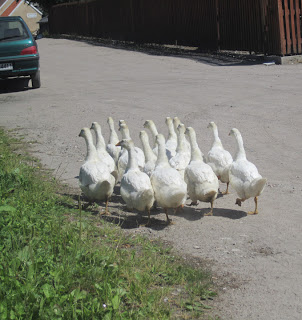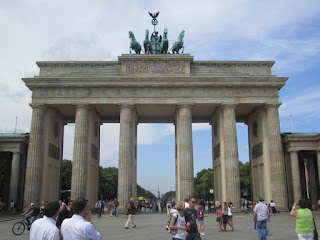Today was our first non-biking day after 11 days of cycling. It may sound like a rest day, but it was anything but that.
Neither of us is much of a tourist, in the usual sense of that term. We see and learn a tremendous amount by biking through cities, towns, and the countryside, since this mode of travel is, unlike car travel, at a pace that really allows you to take in your surroundings. On the other hand, we rarely enter museums, castles, or the like. But Berlin is so rich in twentieth century history that we spent a good part of our day being conventional tourists, visiting Checkpoint Charlie, remnants of the Berlin Wall, the Jewish Museum, and an outdoor exhibit on propaganda and terror in Berlin from 1933-1945. Berlin has done an excellent job of preserving and displaying information about the horrors that emanated from it during the past hundred years, including Naziism, the Holocaust, and Communist misrule.
Besides being tourists, we accomplished a number of tasks in preparation for the rest of our bike trip, including replenishing our candy and cookie supply and hand-washing our clothes in our hotel room. We also went to a bike repair shop to have our chains and tires checked out. Fortunately, our bikes got a clean bill of health.
Another important activity we undertook was to preserve and secure our computer data. We are carrying our laptops and have been doing a considerable amount of work on our trip. Besides keeping up to date on emails, one of our work-related activities has involved creating or updating Powerpoint presentations, which are large in size (~250MB each) because they contain multiple ultrasound images and videos. In preparing for our trip, we were concerned about losing the products of our labors on route, either because of computer failure – they bump around as we cycle, especially over cobblestones – or theft. The potential solution of storing our work on the "cloud" doesn't work, since the large file size means that each presentation takes impractically long to upload. So we brought along four 16GB USB flash drives to mail back home at various times with our latest work efforts. We just encrypted one of these drives and copied our new files to it, and will be mailing the drive home to ourselves tomorrow.
 |
| "Checkpoint Charlie": A reminder of the days when this was the only way to travel between East & West Berlin |
 |
| Preserved sign from the days when Berlin was a divided city |
 |
| A preserved section of the old, hated Berlin Wall |
 |
| Entrance to an outdoor exhibit |
 |
| Jewish Museum (an aerial view; not taken by us) |
 |
| Our laundry drying in the bathroom of our hotel room |



















































